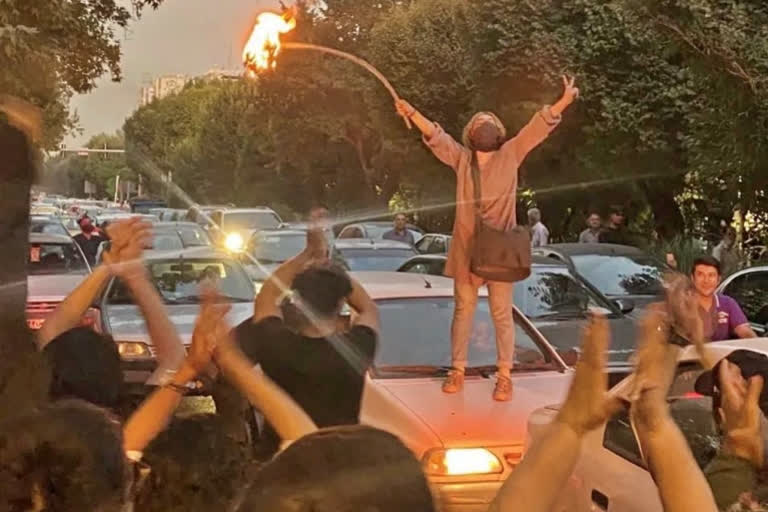Hyderabad: Mahsa Amini, 22, fell into a coma and died following her arrest and alleged beating in Tehran last week by 'Gasht-e Ershad', the morality police, for failing to adhere to Iran's hijab laws.
Her death sparked protests in Iran with the issue gaining worldwide attention, especially after women in the country started to remove their veils and chop their hair to express their condemnation. Established in 2005, the country's morality police are responsible for imposing the hijab laws. After Ayatollah Khomeini's Islamic Resistance Movement took control of Iran in 1979 through a referendum, it became mandatory for women to cover their heads in the country.
Since then, Islamic laws have been in effect in the nation and women are covering their heads when they go out of their homes. Though Iran’s women population had to adopt the Islamic laws imposed on them, the element of defiance has always remained visible when they were allowed to speak beyond the borders of the country.
Iranian Journalist Masih Alinejad, now settled in the US, was arrested in 1994 in Tehran for printing anti-government pamphlets. She has been vocal against Hijab rules and other rights issues related to Iranian women. Interestingly, it is not just hijab rules, women in Iran are also not allowed to sing solo songs.
Also read: Chandigarh: Harnaaz Kaur Sandhu says Hijab is a choice, no need to politicize it.
The nation’s best female singers have remained unknown to the outer world because of the prohibition laws on women’s public singing. Places like Rasht of Gilan province which lies along the Caspian sea are in no way less contemporary than any European nation but beyond the walls of their houses, women have no choices fearing government persecution.
When they are outside of their homes, they behave discreetly, preferring not to display their lifestyle choices including what they want to wear and how they dress. This deception has provoked outrage seeping out to form the general public expression.
The most recent round of Iranian protests sparked by Mahsa's death reveals the depth of rage Iranian women have towards the government and its policies on human rights. The outrage in the form of protests came to the attention of the world after a video went viral showing girls protesting bare-headed and waving their headscarves in defiance of the nation's strict religious rules.
The way Iranian women mustered the courage to go fearlessly against the government has shocked the entire world. People assume that the 2017 incident in which Vida Movahed, an Iranian woman known as "the girl of inqilab street," in which she waved her hijab in front of the crowd as a flag, served as the inspiration for protesting women to wave their headscarves. She was arrested and later released on bail a month later in 2018. Vida’s defiance was widely covered by the western media.
The Iranian government appears to have gone defensive this time around and has begun troubleshooting because it doesn't want things to become worse. Although the President of Iran ordered an inquiry into Mahsa's death, the protesting women are in no mood to give up. The women demand strict action against the officials in the ranks of the 'morality police' responsible for Mahsa’s death.
Also read: Karnataka: Hijabi student creates history by winning 16 gold medals
It appears that the fault lines between the hardliners and liberals are diminishing by the day but the ground reality remains unchanged for women. Mahsa Amini is one classic example. Iran’s two main cities, Qom and Mashhad, where religious leaders rule the roost have this time shown a flexible approach. In fact, Ayatollah Ali Khamenei, the spiritual leader of Iran, sought a liberal stance after realising the extent of society’s mounting anger against the forced laws on women.
Qom and Mashhad house major seminaries that produce hundreds of Islamic scholars including women scholars every year. The women are clad in a veil from head-to-toe in both the cities, and hardly have any of their body parts visible. The seminaries are known as Hows-e-Qom and Hows-e-Mashhad. Both the cities seem to have succumbed this time before the protesting women as is evident from Khamenei's stance.
It is incredibly ironic when a Muslim woman from an Islamic country like Iran is compared with a Muslim woman from secular India. It makes a classic example of a paradox of perception. What is being missed in all of this is that a certain percentage of the female population in an Islamic country crave for the freedom to not wear the hijab and be able to sing.
Also read: Hijab is the religious identity of Muslims: Adv Dave in SC hearing on Hijab case
Similarly, in India, a certain percentage of Muslim women advocate for the hijab and have even moved the Supreme Court after the government in its southern state of Karnataka forbid them to wear the veil in schools and colleges. While Iran saw women tearing hijabs, in India we witnessed young college-going girls protesting to keep one.
While Indian women in the context of Karnataka want to seek help from the constitution, which guarantees the right to freedom of religion, protesting Iranian women dispute the rule of law, which prevents them from speaking out freely.
Although the Karnataka government's stance may seem coercive, Iran's rulebook for women is also explicitly oppressive and violative. What happened to Mahsa is condemnable but so is what Muskaan, the college student chased for wearing a hijab in Karnataka, faced.


